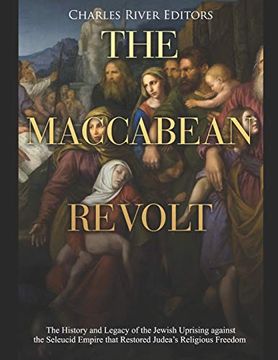The Maccabean Revolt: The History and Legacy of the Jewish Uprising Against the Seleucid Empire That Restored Judea’S Religious Freedom (en Inglés)
Reseña del libro "The Maccabean Revolt: The History and Legacy of the Jewish Uprising Against the Seleucid Empire That Restored Judea’S Religious Freedom (en Inglés)"
*Includes pictures*Includes excerpts from the Bible and ancient accounts*Includes a bibliography for further readingIn 722 BCE, the Neo-Assyrian Empire destroyed the kingdom of Israel, and after a siege of three years, the city of Samaria fell to the troops of Sargon II. As was a common practice in the ancient world, the victor uprooted the inhabitants and forced them into exile, scattering the refugees throughout Asia Minor and possibly Africa to destroy them as a cohesive group and prevent them from possibly revolting. That exile brought about the end of the 10 lost tribes of Israel. Only the much smaller and less important kingdom of Judah, nestled in the arid lands of the south, survived the campaign of the king of Assyria in 701 BCE, which the Bible attributed to the intervention of angels. Modern historians believe that the failure of an army as powerful as Sennacherib's to finish the job was due to a plague or a disease spreading among the ranks and forcing them to withdraw. However it happened, for a few more decades, the kingdom of Judah survived, at the southern tip of the ancient Promised Land, along the western shore of the Dead Sea. It was subjected first to the empire that had tried to destroy it, and then to the Neo-Babylonians. Finally, King Nebuchadnezzar II razed Jerusalem.Jerusalem was uninhabited for much of the 6th century BCE. This period is known as the exile to Babylon, and Bible scholars believe that it was during those years that the Jewish people came into contact with several stories and legends that would later be incorporated into their sacred writings. A generation later, Achaemenid Persian Emperor Cyrus the Great allowed the Jews who so wished to return to Jerusalem to rebuild the temple and reestablish their nation. The reborn country, settled in the province called Yehud Medinata, survived semi-independently, although to a lesser extent than before, until it was again absorbed by the Greek kingdoms that arose after the conquests of Alexander the Great. After that, the Jews remained under the rule of the Hellenistic Seleucids, who ruled their Near Eastern kingdom from Mesopotamia, and occasionally under the rule of the Ptolemies, who reigned from Alexandria, Egypt. For nearly two centuries, the Jews and Greeks of the region were able to live in relative peace. The Seleucid rulers allowed the Jews to practice their religion unmolested, and many of the Jews adopted aspects of Hellenism in order to ingratiate themselves with the rulers. Eventually, though, a number of factors led to a Jewish revolt against Seleucid rule that started in 167 BCE and came to be known as the Maccabean Revolt. The uprising came about as the result of a growing sense of Jewish identity and a sort of proto-nationalism that viewed the Seleucids as enemy occupiers of the Holy Land. On the other side, the Seleucid King Antiochus IV (r. 175-164 BCE) viewed the Jews with suspicion due to their often insular nature and unwillingness to accept Hellenism. These attitudes collided, leading to the Maccabean Revolt. The Maccabean Revolt never clearly ended, so historians continue to debate the timeline, but as it dragged on for some time, it evolved from an independence movement into a war of Jewish conquest. Judea’s sovereignty and temple worship were restored in Jerusalem, but as their luck would have it, the Jewish nation wouldn’t last long due to the rise of Rome. Nevertheless, the revolt had permanent effects on Jewish culture and identity, the Bible, the celebration of Hanukkah, and the geopolitical situation in the ancient Near East.The Maccabean Revolt: The History and Legacy of the Jewish Uprising against the Seleucid Empire that Restored Judea’s Religious Freedom examines the origins of the uprising, the people who led it, and the results. Along with pictures of important people, places, and events, you will learn about the Maccabean Revolt like never before.

